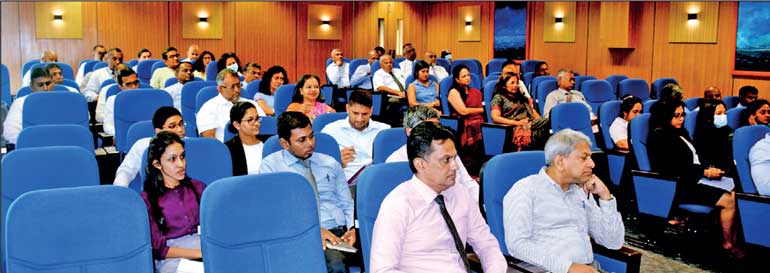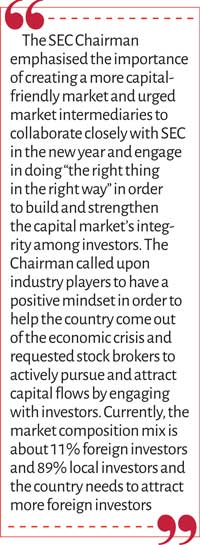Sunday Feb 22, 2026
Sunday Feb 22, 2026
Wednesday, 24 January 2024 00:25 - - {{hitsCtrl.values.hits}}


Capital Market regulator, the Securities and Exchange Commission of Sri Lanka (SEC) recently held meaningful discussions with Chief Executive Officers (CEOs) of stock broker firms and other market intermediaries in separate stakeholder engagements in January 2024.
The meetings were aimed at fostering collaborative efforts to fortify the regulatory framework and operational infrastructure of the securities market. The exchange of ideas and perspectives reflected a shared dedication to upholding the highest standards of integrity and investor protection.
SEC Chairman, Faizal Salieh, SEC Director General Chinthaka Mendis, SEC Deputy Director General Tushara Jayaratne, Colombo Stock Exchange (CSE) CEO, Rajeeva Bandaranaike, CSE’s Chief Regulatory Officer, Renuke Wijayawardhane, SEC Director Supervision, Dilum Mahawatte, and other officials of SEC and CSE participated at the meeting.
The SEC Chairman emphasised the importance of creating a more capital-friendly market and urged market intermediaries to collaborate closely with SEC in the new year and engage in doing “the right thing in the right way” in order to build and strengthen the capital market’s integrity among investors. The Chairman called upon industry players to have a positive mindset in order to help the country come out of the economic crisis and requested stock brokers to actively pursue and attract capital flows by engaging with investors. Currently, the market composition mix is about 11% foreign investors and 89% local investors and the country needs to attract more foreign investors. The Chairman stressed that a positive mindset and persistent hard work is essential to bring in new investments amidst challenging economic conditions. He cautioned against negativism, negative thinking and behaviour that are counter- productive to the growth of the capital market.
Salieh led discussions on the need for a sound Order Management and Broker Back Office System across the stockbroking industry to ensure stability and continuity. The CSE CEO intimated that this matter was thoroughly examined during the recent CSE Board Meeting and will be addressed expeditiously. The industry stakeholders along with the CSE are set to engage in further active discussions to formulate a feasible solution, taking into account the various perspectives presented during the meeting.
The SEC officials stressed the importance of obtaining prior consent of the clients for the execution of transactions and highlighted the need for stock brokers to capture and document such consent properly. He said SEC will carefully assess the proposed amendments to the Trading Participant Rules and communicate its decision in due course.
Importance of aligning market practices with global standards
 Salieh, aiming for a more agile market, proposed the idea of moving from the present T+3 settlement cycle to T+1, with the ultimate goal of achieving a T+0 settlement cycle. Industry representatives responded positively to the Chairman’s suggestion, recognising the potential benefits of a shortened settlement cycle. The Chairman reiterated the importance of aligning market practices with global standards, emphasising the need to eventually move towards a T+0 settlement cycle. It was noted that a tighter settlement cycle would help improve liquidity, reduce risk and make the market more efficient.
Salieh, aiming for a more agile market, proposed the idea of moving from the present T+3 settlement cycle to T+1, with the ultimate goal of achieving a T+0 settlement cycle. Industry representatives responded positively to the Chairman’s suggestion, recognising the potential benefits of a shortened settlement cycle. The Chairman reiterated the importance of aligning market practices with global standards, emphasising the need to eventually move towards a T+0 settlement cycle. It was noted that a tighter settlement cycle would help improve liquidity, reduce risk and make the market more efficient.
Senior officials of the CSE, provided insights into the steps taken by the CSE to initiate the process of bringing down the settlement cycle to T+2 days as an initial step. It was noted that other jurisdictions use the SWIFT system that significantly expedites the settlement process but that associated costs is a limiting factor when considering the use of SWIFT in the Sri Lankan market. SEC Chairman pointed out that connecting all stock brokers engaged in foreign transactions to SWIFT would result in instant trade confirmations.
The SEC Chairman stressed the crucial role of Compliance Officers and the requirement for these officers to operate independently, free from other operational roles and responsibilities. He said the effectiveness and robustness of the compliance function would be a key factor for evaluation during the licence renewal process of Market Intermediaries. He urged the President of the Colombo Stock Brokers’ Association to take the lead in forming the Compliance Officers’ Forum without delay.
Additionally, the meeting delved into critical areas of transaction monitoring and reporting in alignment with Financial Intelligence Unit (FIU) regulations. SEC Director Supervision Dilum Mahawatte highlighted the pivotal role of the Central Depository System (CDS) in sanction screening and emphasised that the initial responsibility for screening lies with the CDS during the formal onboarding of clients. The CDS has already implemented a process for both the initial screening and periodic screening of the existing client database whenever there is a change to the sanctions list.
To ensure a comprehensive and timely approach to non-compliance, Mahawatte mentioned the necessity of implementing a process where any identified non-compliance by the CDS is promptly communicated to stock brokers. This collaborative approach aims to empower stock brokers to take swift and effective actions in response to the identified issues.
The agenda covered a range of pertinent issues and housekeeping matters, and included Related Party Transactions, the prompt submission of business plans for year 2024 by all Market Intermediaries, the need for concerted efforts to pursue and attract foreign investment as well as increasing marketing efforts aimed at local retail investors and the need for all organisations to formulate a comprehensive data protection framework in accordance with the Personal Data Protection Act.
The long overdue demutualisation of the CSE was discussed. SEC officials stressed the importance of demutualisation in order to transform the Exchange into the next league of operations with greater operating efficiency, strategic investments and better governance structure. The SEC Chairman said demutualisation was on top of the Capital Market Reforms Agenda and urged the stockbroking community to cooperate and support the expeditious enactment of the Demutualisation Bill.
Responding to a concern raised by a stock broker representative regarding the pressing need to streamline and expedite the training process for Registered Investment Advisers (RIAs), SEC Deputy Director General Tushara Jayaratne confirmed that SEC will soon allow exemptions for certain professional qualifications and university degrees.
The SEC officials expressed concerns regarding the conduct of certain RIAs based on SEC’s inquiries into investor complaints and emphasised the need for better self-governance within the industry. The SEC Chairman called upon the firms to build respect for the broking industry and stressed the need for raising professional standards. Market Intermediaries were urged to act responsibly and diligently, particularly in managing client relationships, risk and compliance. He reiterated that SEC stands firm and steadfast in its commitment to uphold good governance, market integrity, investor protection and the public interest.
The meeting concluded with SEC reaffirming its commitment to ongoing collaboration with the industry to implement effective solutions and drive positive change. The outcomes of these meetings are expected to shape future regulatory initiatives and industry practices, fostering a more transparent, efficient, and resilient capital market.